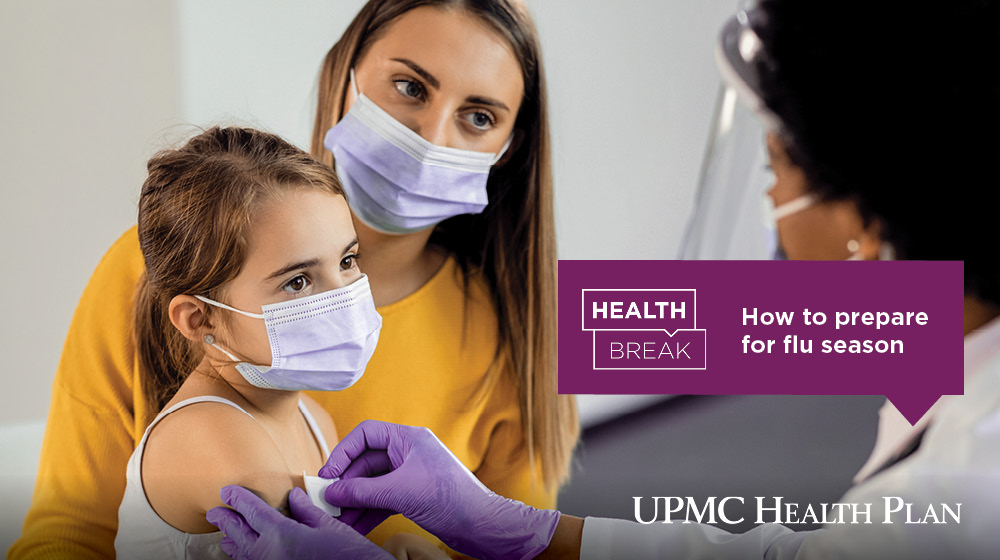Health Break: How to prepare for flu season

A podcast for UPMC Health Plan members, Health Break is your quick guide to caring for your mental and physical health, prioritizing wellness, and making the most of your health insurance plan.
Episode 42: Take a Health Break with Dr. Maria Guyette
Dr. Maria Guyette takes a Health Break to talk with us about preparing for flu season and why we need to be vaccinated against the flu each year.
Episode transcript:
Camille: Welcome to Health Break by UPMC Health Plan, your quick guide to health, wellness, and how to make the most of your health insurance plan. I’m your host, Dr. Camille Clarke-Smith. I help to oversee the quality of the plans and programs we offer at UPMC Health Plan.
Angelo: And I’m your co-host, Angelo Bartic. I’m a health coach who works with our members on making healthy lifestyle habits and setting goals. This is your…Health Break.
Hey everyone, it’s Angelo Bartic. Today, Dr. Maria Guyette talks about how we can prepare for the upcoming flu season. Dr. Guyette, thank you so much for spending some time with us today.
Dr. Guyette: Thanks so much for having me.
Angelo: To get started, can you tell us a little bit about the flu?
Dr. Guyette: Sure. The flu is a respiratory illness caused by the influenza virus. Respiratory illnesses are usually caused by viruses that infect the nose, the throat, and sometimes the lungs. So those are what we refer to as the respiratory tract. They are spread through the tiny droplets that you make when you cough, when you sneeze, when you talk. When you are coughing and sneezing and talking and breathing, you are sharing those tiny droplets with the folks around you. So the folks around you can pick those up either by standing close to you or by touching surfaces that you may have touched and then touching their face. So if you rub your eye, you can get the illness that way. Flu symptoms are usually more intense than a common cold, so you may have other body systems affected as well. Sometimes people experience muscle aches, a headache, nausea, vomiting, diarrhea, or fevers.
Angelo: Now we know about the flu vaccine as a way to help protect ourselves, but why do we need a flu vaccine every year?
Dr. Guyette: That’s a great question. So every year the influenza virus changes. The way a virus works is that it’s constantly making copies so that it can spread, and every time it makes one of those copies, it has the opportunity to introduce a mutation. A mutation may not do anything, but sometimes those mutations can make the virus easier to transmit to other people, whether it makes them last longer outside your body or whether it makes them possible to spread farther or whether it makes it possible for them to make people sicker so they can make more copies of the virus. So every year the strains of the influenza virus are changing a little bit. The flu season in the southern hemisphere is during their winter, so it’s six months off of our flu season. Twice a year the World Health Organization convenes to look at what flu strains are circulating in the world right now, and the southern hemisphere looks to us in the northern hemisphere to figure out how to make their next flu vaccine, and we watch what they’re experiencing to figure out how to make our next flu vaccine.
Angelo: That’s some really helpful information. Can you tell me who is eligible to receive a flu vaccine?
Dr. Guyette: The CDC recommends that everyone 6 months and older get a flu vaccine every year.
Angelo: So what might someone experience after receiving the flu vaccine?
Dr. Guyette: After getting the flu vaccine some people experience side effects. Some of those side effects can be some irritation and soreness at the site of the injection in your arm, and some of those side effects can be related to your whole body. So body aches, headaches, nausea—and those are usually indications of your body’s immune system reacting to the vaccine and learning about how to fight the flu in the future. These side effects are usually mild and usually go away in one to two days. You can’t get the influenza virus from the flu shots.
Angelo: Oh, so you can’t get the flu from the flu shot, but if you get the flu shot, can you still get the flu?
Dr. Guyette: Great question. So yes, you can’t get the flu from the flu shot. Yes, you can get the flu after you’ve had the flu shot, but it generally gives you a milder illness. The flu shot protects you from serious illness and death. The next level of protection is living in a vaccinated community. So it’s really important for you to still get your flu vaccine every year and make sure you are up to date on your COVID vaccine too. If you feel comfortable sharing with your family and friends your reasons why you got those vaccines, maybe you’ll help them learn a bit more. Because a vaccinated community is protection for us all.
Angelo: In addition to staying up to date on our flu vaccine, what are some other ways that we can prepare for flu season?
Dr. Guyette: So like we talked about, the flu spreads in shared spaces. So when it’s spreading in those shared spaces, there are some things we can do to make it less likely that each of us is going to get the flu. So the first one is hand washing. Making sure that you have hand sanitizer and soap readily available to wash your hands more frequently during flu season. Since we are talking about shared spaces, one of the other things we can do is mask when we’re in close spaces. So if you’re riding the public transit during flu season, it’s helpful to have a mask on. The third thing to think about is staying home when you’re sick, which gives us some distance from other people and decreases the amount of time we’re in shared spaces.
Angelo: Thank you so much, Dr. Guyette, for taking a Health Break with us today and talking about how we can prepare for the upcoming flu season.
Dr. Guyette: Thanks so much for having me.
Angelo: Contact your primary care provider or any local in-network pharmacy to schedule your flu shot. The flu vaccine is free for UPMC Health Plan members. If you have to pay for a shot, we will reimburse you. You can complete a reimbursement form on MyHealth OnLine, or print it out and mail it to us. For more information, visit our flu member guide linked in the show notes.
Find show notes and more information at upmchealthplan.com/podcast. Join us as we continue exploring health, wellness, and how to make the most of your health insurance plan in the next episode of Health Break.
This podcast is for informational and educational purposes. It is not medical care or advice. Individuals in need of medical care should consult their personal care provider. Views and opinions expressed by the hosts and guests are solely their own and do not necessarily reflect those of UPMC Health Plan and its employees.
Related to this episode:
- Visit our flu member guide for answers to all your questions.
- Find a doctor or provider in the UPMC Health Plan network to schedule your flu shot.
- Get your flu shot at a participating in-network pharmacy such as CVS, Rite Aid, Giant Eagle, Martin’s, or Giant.*
- Log in to MyHealth OnLine to submit a flu shot reimbursement form if you already paid or were charged for your flu shot.
- Read more:
About Dr. Maria Guyette:
Maria Koenig Guyette, MD, is an emergency physician caring for patients at UPMC Shadyside Emergency Department, and a senior medical director for the UPMC Health Plan caring for the population health of UPMC Community HealthChoices participants. She is an associate professor on the faculty of the University of Pittsburgh School of Medicine, where she teaches residents and medical students about health policy, advocacy, equity, and health systems.
*The listed pharmacies are in-network for members who reside in Pennsylvania as of October 2022. If you are an out-of-state member or need further assistance finding a pharmacy, please call the number on your member ID card.




